Predators of the West: Introduction to the Studio Discussion
Twenty people from around the intermountain west gathered at the Idaho Public Television studio on Wednesday afternoon September 3rd to talk predators. Meet each of the participants below. Clicking on a photo will take you to that person's bio.
Over the course of two hours, the discussion took on three major topics: non-lethal control of predators (focusing on wolves), habitat corridors for wildlife (featuring grizzly bears), and what happens when people move away from established settlements and find themselves living with predators (especially mountain lions).
Several themes wove themselves through the discussion of all three topics. One is the difference in values, particularly between those who champion property rights and those who would defend the "rights" of predators. The other is the importance of hunting, both as a means of controlling predators and as a valued activity in itself.
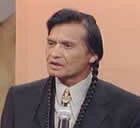 |
Granted the reintroduction of the gray wolf has brought on other . . . concerns and risk factors, but indeed if we're ever to hand off a legacy, a heritage of this country that is so rich, it must be with sacrifice.
Levi Holt, Nez Perce tribe, Idaho
|
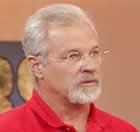 |
The issues oftentimes revolve around values, personal values. Some people are adamantly opposed to killing animals, others find it very acceptable and that's where the struggle really exists today.
Chuck Schwartz, Interagency Grizzly Bear Study Team, Montana
|
 |
Wolves are going to be killed. It's unavoidable that wolves are going to have to be managed and at some point, if the recovery effort is as successful as it's been, it's reasonable to assume that wolves will be harvested or culled through hunting and other harvest measures.
Carter Niemeyer, US Fish and Wildlife Service, Idaho
|
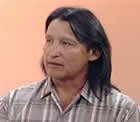 |
I'd like to begin with the label of predators. I think it is unfair because it immediately evokes a fear people are going to be preyed on if they go outside their doors. I think we have to realize these animals are teachers. They're telling us what's going on in their environment, why they're in the urban areas, why they aren't in the mountains . . .
Ken Hall, Confederated Tribes of the Umatilla Indian Reservation, Oregon
|
 |
[I]t's very important to consider the rights of people whose life and property are being infringed upon. That's a constitutionally protected right, and if we're going to be playing around with non-lethal control methods and experimenting with this non-essential experimental species, the wolves, then there needs to be something in place to protect these people's constitutional rights.
Crosby Allen, Fremont County Commission, Wyoming
|
 |
[W]e will not go out and indiscriminately shoot [predators], but we absolutely have to have the right to protect what is ours. And I don't know about anybody else in this room, but if somebody came into my back yard and shot my dog I'm going to be mad.
Jennifer Ellis, Idaho Cattle Association, Blackfoot, Idaho rancher
|
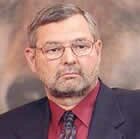 |
[T]he worst allotment [of federal land] is better than the best subdivision. When you compare that to conservation of species, long-term perpetuation of any critters . . ., you've got to bring private property to the table; you can't do it on the back of federal ground. And if we're going to recover species, even ones that are abundant currently and keep 'em abundant, you've got to have good conservation going on private land.
Jim Caswell, Idaho Office of Species Conservation, Boise
|
 |
I love the statement, that grizzly bear habitat is in the human heart -- I hope our heart is really big.
Amaroq Weiss, Defenders of Wildlife, Oregon
|
 |
[W]e're pushing on the brink of more development and we're just getting more into the grizzly bear and wolves' habitat, and it's rightfully theirs; it's not even, wasn't even rightfully ours in the first place.
Aaron Miles, Nez Perce tribe, Idaho
|
 |
[I]n reality these [corridors] will serve to minimize human conflict with these animals, and the fact of the matter is that although established specifically for grizzly bears where we are, all species benefited -- big game, forest carnivores, small animals . . .
Tom Parker, Northwest Connections, Montana
|
 |
[T]he reason I'm here is for that vast constituency for these wildlife that go beyond the people that want to kill them, that go beyond the people that just deal with the problems that they pose. I don't want to belittle those problems, but in the grand scheme of things there's a tremendous upwelling up support for these animals' lives, living, breathing along the landscape, and people want to hold on to our heritage.
David Gaillard, Predator Conservation Alliance, Montana
|
 |
I think one of the things we've learned in managing endangered species is that if you don't have the support of the local population that lives with them they're very difficult to recover. We have a syndrome called shoot, shovel and shut-up that occurs oftentimes when the local population doesn't support having these species co-mingle with them.
Paul Hoffman, US Department of Interior, Washington D.C.
|
 |
I think for the people who are watching this show -- I mean I keep bringing it back to you, but it's really your problem to solve. If you want a faster way to get somewhere, there's a cost. If you're a vegetarian and you're eating stuff that's produced with hydrocarbons, you're . . . killing things.
Dean Miller, Idaho Falls Post Register, Idaho
|
 |
[W]e are at a time right now when we have the opportunity to fix something that was broken. We came into the west and we fragmented the habitat through roads and human development and various other things. We have the tools, we have the partnerships in place, and we have the knowledge to fix this.
Chris Servheen, US Fish & Wildlife Service, Montana
|
 |
During the course of our conversation we've heard a lot of terms like ecosystem management, ecosystem integrity, thinking holistically, managing holistically, terms like keeping all the tools in the toolbox. I think when we think about ecosystem management, we've got to realize that humans are part of that equation.
Kent McAdoo, University of Nevada at Reno
|
 |
And when you look at where the funding comes from for Fish and Game agencies to manage these prey bases . . . which are elk and deer primarily as well as the carnivore populations, it's the hunters who are paying for that. . . . [I]f we lose that hunting tradition, my question is, Who's going to pay for all of this? It's hunters who've paid for it traditionally.
Bill Wall, Safari Club International Foundation, Washington D.C.
|
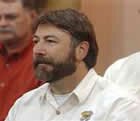 |
[W]e've come a long way in wildlife management for people to accept the fact that wildlife, all wildlife, has its place. That doesn't mean that we're here to say this is good wildlife, this is bad wildlife -- we did that. Bad wildlife were species that conflicted with our interests.
Steve Nadeau, Idaho Department of Fish and Game, Boise
|
 |
[A] lot of times I hear the same arguments over and over and over again, and the same statements. And I don't think we ever quite figure out that we all love wildlife, we all love the outdoors and the system, and we all need to find a way to make it work rather than just lodging bullets at each other all the time.
Margaret Soulson Hinson, Livestock producer, Idaho
|
 |
We hire these biologists like Chris [Servheen], Carter [Niemeyer] -- all these are supposed to be the best in their field that are doing this work, but yet we never trust 'em enough to let them do it. We question 'em, we don't think they're doing it right. We want to change it just a little bit. Why are we paying 'em if we have to do it for 'em?
Jon Robinett, Rancher, Dunoir Valley, Wyoming
|
 |
I think we've been focusing on some of the more defined sound-byte type issues that drive the social questions surrounding predator management in North America. And I think that's part of the problem. We look at the individual issue -- it's a bloodthirsty animal! Well we're predators too and we're bloodthirsty too. So is that wrong? I would say no; we're focusing on the wrong thing.
Carl Scheeler, Confederated Tribes of the Umatilla Indian Reservation, Oregon
|
|
Navigation Links
|

